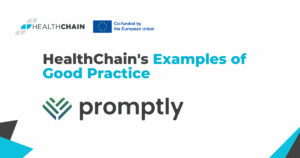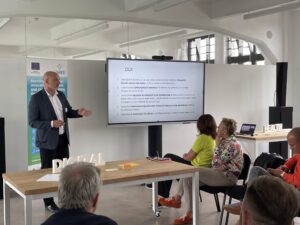Kirurški Sanatorij Rožna Dolina, a prominent healthcare institution in the Western Slovenia region, has identified two critical healthcare challenges impacting patient care and hospital operations. To address these challenges, four innovative SMEs have been selected to co-create solutions—each challenge will be tackled by a SME from Slovenia, ensuring local expertise, and aSME from another consortium region, fostering interregional innovation. These partnerships are designed to deliver cutting-edge solutions that improve patient outcomes and optimize hospital efficiency. Here are the four companies selected to collaborate on these healthcare challenges in Western Slovenia.
Hospital Challenge 1: HIPRO
Challenge overview
Kirurški Sanatorij Rožna Dolina faces challenges in monitoring the rehabilitation progress of patients after their hospital discharge. Ensuring patients are following their prescribed recovery plans and addressing potential complications early is crucial for successful outcomes. A system for remote monitoring would greatly improve patient oversight and reduce hospital readmissions due to rehabilitation complications.
Proposed solution
MobileCare+ is designed to revolutionize post-operative care for elderly patients following fast-track hip surgery (FTHS). This solution demonstrates significant potential in enhancing the integration of new knowledge by leveraging advanced technologies and methodologies. The main characteristics and components of MobileCare+ include a patient-centric mobile app, an HL7 FHIR big data infrastructure, a user interface for clinicians, a robust privacy and security pillar, and an advanced Language Model (LLM) pipeline for the collection of Patient-Reported Outcomes (PROs).
IT Companies co-creating the solution
- Zenlab
Zenlab, a software development company, is responsible for developing MobileCare+, a mobile app that serves as a patient-centred platform and enables real-time monitoring of patients’ rehabilitation progress. By integrating data from wearable devices, Zenlab’s system will provide healthcare professionals with insights into a patient’s recovery, allowing them to adjust treatment plans accordingly and ensure that patients stay on track for optimal recovery.
- Biromatik NT d.o.o.
Biromatik NT will enhance MobileCare+ by incorporating advanced data analytics that help predict recovery timelines and provide actionable insights for healthcare providers. Their expertise in integrating real-time alerts and decision-support tools will ensure that the platform delivers timely, relevant information, improving the quality of care and patient outcomes during rehabilitation.
Hospital Challenge 2: MEPRO
Challenge overview
Mental distress—characterized by high levels of mental, physical, and emotional stress before and after surgery—can indicate underlying medical issues that patients may be reluctant to discuss with family or healthcare providers. Detecting mental distress is challenging due to its subjective nature, as signs can vary widely among individuals, and some may conceal their distress. Existing pre-screening systems for mental health distress aim to identify individuals at risk, but there is currently no user-friendly self-assessment mobile application available that meets the specific needs of hospitals in Slovenia.
Proposed solution
COMPASS is a comprehensive framework designed to collect digital biomarkers non-intrusively and assess individuals for the risk of mental distress. This innovative system comprises three key components: the mPatient App for patients, the Risk Assessment Model, and the mClinician App for healthcare providers. Real-world data is sourced from diary recordings, physiological biomarkers obtained from smart wearables, and validated instruments like PHQ-9, GAD7, EQ5D 3L, and VR-12. The Risk Assessment Model, serving as the central component, employs (X)AI techniques and traditional AI approaches to analyse data patterns and create personalized risk profiles. Machine learning-based predictive models for mental health will be developed and statistically validated by clinicians.
IT Companies co-creating the solution
- DITA
DITA will lead the development of COMPASS, focusing on creating a reliable system for monitoring and managing medication workflows. The platform will provide healthcare teams with automated alerts, track medication orders, and verify doses, ensuring that the right medication is administered at the right time, significantly reducing the risk of errors and enhancing patient safety.
- NVISION Systems and Technologies, S.L.
NVISION will play a crucial role in supporting various critical tasks within COMPASS. Their responsibilities will include quality assurance, administrative coordination, and ethical oversight, along with managing the dissemination and communication strategy. NVISION will also analyze technical requirements for the physician and patient apps, ensuring compatibility with iOS and Android platforms, while developing the physician application, integrating backend functionality, personalized care workflows, and third-party device compatibility. They will also facilitate co-creation methodologies and support the deployment of living labs for real-world testing of the platform.
In the coming months, the selected SMEs will receive comprehensive support from HealthChain. They will engage in an intensive co-creation and piloting phase with the healthcare organization to test and validate their solutions in real-world settings. Additionally, they will gain access to expert guidance to refine their business strategies and scale their innovations for broader impact.








